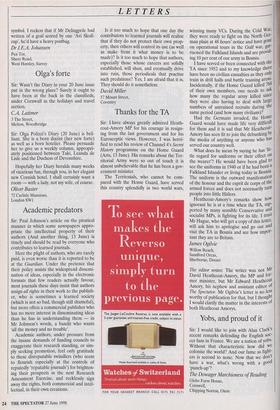Academic predators
Sir: Paul Johnson's article on the piratical manner in which some newspapers appro- priate the intellectual property of their authors (And another thing, 13 June) is timely and should be read by everyone who contributes to learned journals.
Here the plight of authors, who are rarely paid, is even worse than it is reported to be at the Guardian. Under the pretence that their policy assists the widespread dissemi- nation of ideas, especially in the electronic formats that few readers actually favour, most journals these days insist that authors assign all rights in their work to the publish- er, who is sometimes a learned society (which is not so bad, though still shameful), but more often a commercial publisher who has no more interest in disseminating ideas than he has in understanding them — in Mr Johnson's words, a bandit who wants `all the money and no trouble'.
Academic authors, under pressure from the insane demands of funding councils to exaggerate their research standing, or sim- ply seeking promotion, feel only gratitude to these disreputable swindlers (who seem to flourish especially at the controls of reputedly 'reputable journals') for brighten- ing their prospects in the next Research Assessment Exercise, and recklessly sign away the rights, both commercial and intel- lectual, in their own creations. Is it too much to hope that one day the contributors to learned journals will realise that if they do not protect their own prop- erty, then others will control its use (as well as make from it what money is to be made)? Is it too much to hope that authors, especially those whose careers are solidly established, will shun, and eventually drive into ruin, those periodicals that practise such predations? Yes, I am afraid that it is. They should do it nonetheless.
David Miller
57 Mount Street, Coventry


























































 Previous page
Previous page